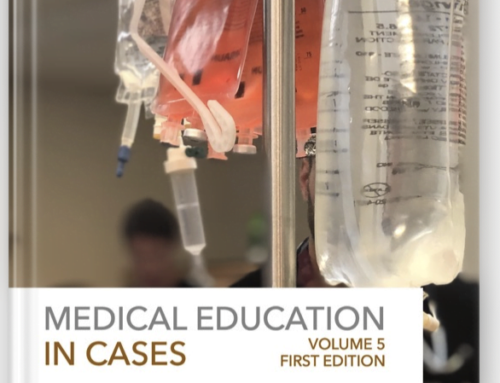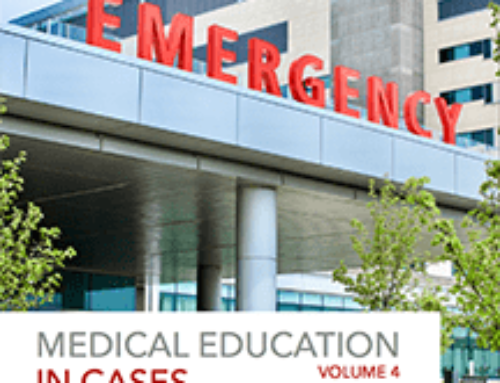 Welcome to season 4, episode 6 of the ALiEM Medical Education in Cases (MEdIC) series! Our team (Drs. Tamara McColl, Teresa Chan, John Eicken, Sarah Luckett-Gatopoulos, Eve Purdy, Alkarim Velji and Brent Thoma) is pleased to welcome you to our online community of practice where we discuss the practice of academic medicine!
Welcome to season 4, episode 6 of the ALiEM Medical Education in Cases (MEdIC) series! Our team (Drs. Tamara McColl, Teresa Chan, John Eicken, Sarah Luckett-Gatopoulos, Eve Purdy, Alkarim Velji and Brent Thoma) is pleased to welcome you to our online community of practice where we discuss the practice of academic medicine!
This month, we present a case of an emergency attending who questions the work-ethic, dedication and professionalism of his residents after an on-shift teaching interaction.
MEdIC: The Case of the Lazy Learners
By Dr. Andy Grock
“And that is best available evidence around tetracaine in corneal abrasions. Hopefully that answered your question!” Chris finished his mid-shift teaching with a flourish. He felt confident that his short talk had been well received and educational to the residents working with him in the emergency department that day. Always the enthusiastic teacher he added, “Before going back to work, do you have any questions about this topic or anything else you’ve been curious about?”
After a few seconds of silence, one senior resident yawned and responded, “Quick, someone ask him something so we won’t have to go back to seeing patients.” After some chuckles from the other residents, a junior resident added, “We only have 3 hours left! Let’s try to stretch this out until our shifts are over! Nothing too exciting has happened today anyways.” The residents laughed again, did not ask any further questions, and then returned to providing patient care.
Chris returned his focus to the busy emergency department and immediately noticed that numerous patients had yet to be seen with even more in waiting room. Two patients had concerning vital signs and several others had potentially dangerous chief complaints. Something about the residents’ comments and reactions started to bother Chris, but it wasn’t until his busy shift had ended that he recognized the inappropriate nature of the interaction. He began to wonder what would have happened if one of the hard-working nurses or management staff had overheard those earlier comments from his residents. Or even worse, what if a patient or their relative had been within earshot.
Chris also considered the implications these seemingly innocent and flippant comments may have on resident perspective with regards to their profession and their responsibility to their patients. During his residency, Chris’ mentors had imparted and stressed the old adages – “the sickest patient in the room is the next patient to be seen” and “more patients, more learning.” Were these residents not cognizant of the importance of their job? Seeing patients was supposed to be an honor, a noble responsibility, not something residents should try to avoid!
The more Chris reflected, the more he started to doubt the residents’ work ethic and dedication. He was genuinely concerned about their future practice when they eventually complete their training. Chris felt guilty for not immediately addressing and correcting the comments made by his residents. He had missed a valuable opportunity to coach and demonstrate professionalism to his learners.
Discussion Questions
- Is resident feedback necessary in this scenario? If so, describe your approach to this situation.
- Could resident burnout be a factor in this scenario? If so, would that change your approach to feedback? How should we address the issue of burnout in residency training?
- How does your institution address lapses in resident professionalism?
Weekly Wrap Up
As always, we will post the expert responses and a curated commentary derived from the community responses 2 weeks after the case is published.
This month, our 3 experts are:
- Dr. Sandy Dong
- Dr. Taku Taira
- Dr. Sean Moore
On April 14, 2017 we will post the curated commentary and expert responses to this case! After that date, you may continue to comment below, but your commentary will no longer be integrated into the curated commentary. That said, we’d love to hear from you, so please comment below!
All characters in this case are fictitious. Any resemblance to real persons, living or dead, is purely coincidental. Also, as always, we will generate a curated community commentary based on your participation below and on Twitter. We will try to attribute names, but if you choose to comment anonymously, you will be referred to as your pseudonym in our writing.
[su_spoiler title=”MEdIC Series: The Concept” style=”fancy” icon=”caret”] Inspired by the Harvard Business Review Cases and initially led by Dr. Teresa Chan (@TChanMD) and Dr. Brent Thoma (@Brent_Thoma), the Medical Education In Cases (MEdIC) series puts difficult medical education cases under a microscope. On the last Friday of the month, we pose a challenging hypothetical dilemma, moderate a discussion on potential approaches, and recruit medical education experts to provide “Gold Standard” responses. Cases and responses are made available for download in PDF format – feel free to use them! If you’re a medical educator with a pedagogical problem, we would love for you to get involved in the MEdIC series! Send us your most difficult dilemmas (guidelines) and help the rest of us bring our teaching to the next level.[/su_spoiler]




